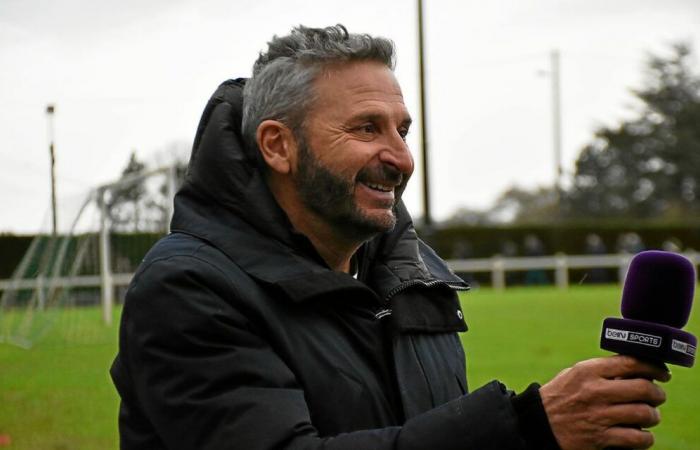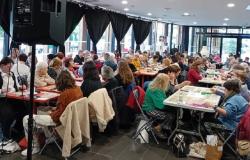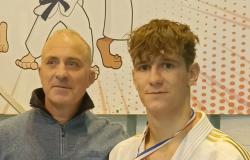
What moment in your career are you most proud of?
It’s about having managed to make the most of my means. As I didn’t attend a training center, I had some shortcomings, but I managed to compensate for them thanks to my heart, my energy, my volume of play. And I had an honorable career. When I was a kid, I would have liked to play for the French team, to play in the Champion Clubs’ Cup. I didn’t have the level because I was missing the last step to go even higher. But my greatest pride, when we look in the rearview mirror, is to have played in historic clubs like Saint-Étienne, like Rennes, like Sochaux and to have experienced three rises with these clubs. I wanted to play in Brittany because my grandfather came from there (from Pont-Croix). I wanted to play for Saint-Étienne and I had the chance to be captain. I was able to play in the Bundesliga in Germany and in Ligue 1 in France. I have no regrets about my journey.
Which opponent did you hate to face?
I’ve always said it in interviews. It was a nightmare for me when I found Lorient: it was Pierrick Le Bert (now coach of the US Concarneau reserve team), a small player who was eccentric. I was big and powerful, he had a very low center of gravity and he felt the blows well on his first check. I think one time we took four, he gave me misery. It was for my first match against Lorient and after that, every time I played Lorient, I looked to see if he was suspended or injured. I couldn’t catch it. I was trying to impose my physical mass and bring a fight. But he was too trickster and too intelligent on his first steps for me to even get in touch with him. Today, we hang out or send each other little text messages on social networks, because I had and still have a lot of respect for this player.
The hottest stadium you’ve played in?
Saint-Étienne is really very, very special when it starts to rumble, in a positive sense. Then, I found that, when we played at the Parc, with the resonance box that there was, with what the two kops were capable of releasing at the time, it was still quite substantial. And finally, I had the chance to play and then coach in several configurations at the Vélodrome stadium. I really liked it before the 98 World Cup, I thought it was heavy. Then, as it wasn’t closed, it flew away and it wasn’t the same atmosphere at all. Then, I knew him with Bordeaux (as assistant), I said to myself: “What is this crazy stadium”. Since they closed, when there are 60,000 people, it’s terrible. But it can be a driving force as well as, sometimes, a brake on apprehension.
The most memorable coach you have known?
The one who changed my conception of football was Michel Le Milinaire. Already, he was extremely pedagogical and for me, it went rather well with coaches who explained certain things. As I did not attend a training center, I have always been able to maintain my free will. And Michel Le Milinaire, I think he very quickly perceived my personality. The first few months I played, then I disappeared for several weeks. It was the year of the rise with Stade Rennais. He explained things to me calmly. Above all, he explained to me what he expected of me and he revolutionized the way I think about football. And for that, I will always be grateful. I arrived in France at just 23 years old, and I had fairly definitive ideas about football. I had only known individual marking and at Stade Rennais, we played in zones. Most of the time, on the goals, I was at fault because I had a problem with alignment, covering space. And at first, people were very kind to me. They continued to do post-training work, at 23, when perhaps they expected a more finished, more mature player. These many weeks then allowed me to play all these years in French football. Michel Le Milinaire was an outstanding lodger, a nice rascal. I had a lot of affection for the couple because his wife was inseparable from what the coach put in place. Ultimately, he was still too playful in his head. He exuded a form of respect without being authoritarian. And that’s class. When you were angry, you went into his office with your anger. And when you left, you didn’t even know why you came back into the office because it had put so much fog in your brain. Made you understand that, ultimately, there is more important in life than football.
The goal you should never have scored?
The goal I scored against Rouen with Stade Rennais. He is extraordinary. I haven’t scored many, but this one, when I get the ball, I dribble, I go into the middle of the field and I shoot. I think we win 3-1 or 3-2 (3-2 in 1993) at the Robert-Diochon stadium. I had fun and you can see my determination on the goal.
All my jerseys, all my memories, my parents have them.
The jersey you collected and will never give away?
All my jerseys, all my memories, my parents have them. But, with Saint-Étienne, we played against Inter where there were big players. I get Zamorano’s jersey*. He always played with number 9, but the one I have is number 18. And during the World Cup in Qatar (2022), I recognize the helicopter (his nickname). He didn’t know me but I went to see him and said: “Mr Zamorano, I still have your jersey at home. But, on the other hand, I have the 18th.” And he said to me: “Ah yes, it’s true. Because that’s 1 + 8.” And I said to him: “Yes, but why? » He told me: “At Inter, there could only be one number 9: it was Ronaldo. » When Ronaldo arrives and asks for 9, you give the jersey.
Your ideal eleven with players with whom you have played?
*Former Chilean international (34 goals in 69 caps) who notably played for Real Madrid (1992-1996) and Inter Milan (1996-2001)
Patrick Guillou
Born April 16, 1970 in Villingen (FRG)
Players’ journey:
1988-1990: Friborg (ALL)
1990-1993 : Bochum (ALL)
1993-1994: Stade Rennais
1994-1996: Châteauroux
1996-1997 : Red Star
1997-2000: Saint-Étienne
2000 : Hibernian (ECO)
2000-2001: Sochaux
2001-2003: Saint-Étienne
2004-2005 : Rouen
Assistant coach:
Bordeaux (2014-2016) et Wolfsburg (2017)
Prize list
French Division 2 champion with Saint-Étienne (1999) and Sochaux (2001)
Sports





